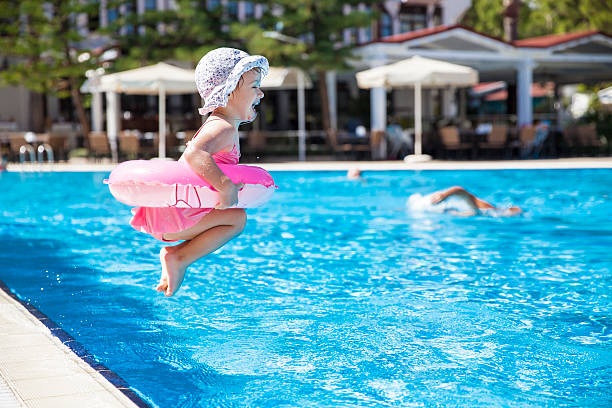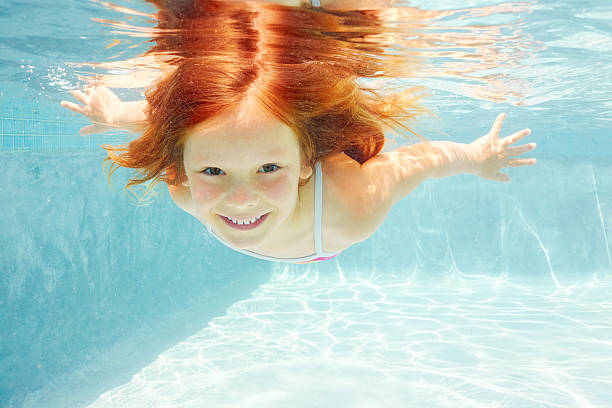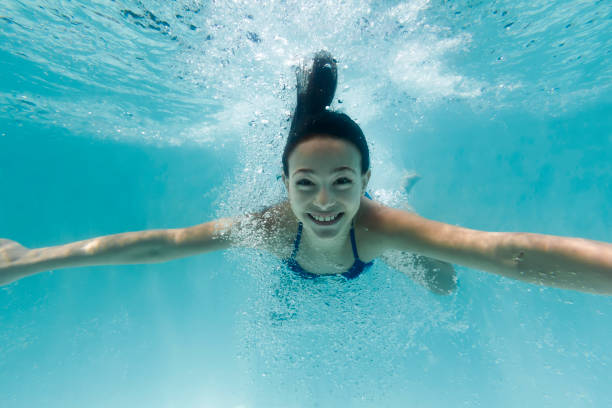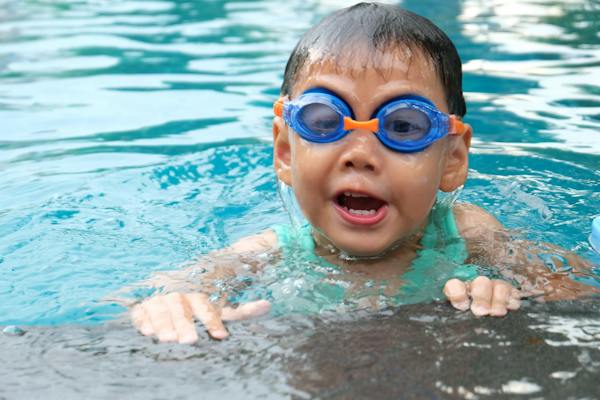Rainwater, a natural blessing from the skies above, can have a significant impact on the chemistry of your pool water. Understanding the dos and don’ts when it comes to managing rainwater in your pool is crucial for maintaining optimal water quality and ensuring a safe swimming environment for you and your family.

The Importance of Understanding the Impact of Rainwater on Pool Chemistry
Rainwater contains a variety of impurities and contaminants that can alter the chemical balance of your pool water. These impurities include dust, pollen, bacteria, and even pollutants from the atmosphere. When rainwater mixes with your pool water, it can disrupt the delicate balance of pH, alkalinity, and sanitizer levels, leading to cloudy water, algae growth, and potential health hazards for swimmers.

Dos:
- Test and Adjust pH Levels Regularly: After heavy rainfall, it’s essential to test the pH levels of your pool water and adjust them as needed. Rainwater is naturally acidic due to the presence of carbon dioxide, which can lower the pH of your pool water. Use a reliable test kit to measure the pH levels and add pH increaser if necessary to bring the levels back to the ideal range of 7.2 to 7.6.
- Maintain Proper Chlorine Levels: Rainwater can dilute the chlorine concentration in your pool, making it less effective at killing bacteria and controlling algae. After a rainfall, check the chlorine levels and shock your pool if needed to restore adequate sanitizer levels. Consider using a stabilizer to help protect chlorine from being rapidly depleted by sunlight.
- Clean and Skim Debris: Remove leaves, twigs, and other debris that may have been carried into your pool by the rain. Use a skimmer or leaf net to skim the surface of the water and prevent organic matter from decomposing and affecting water quality. Regular cleaning helps maintain a clean and inviting swimming environment.
- Run the Filtration System: Increase the filtration and circulation of your pool water after heavy rainfall to remove any contaminants and restore clarity. Run your filtration system for longer periods or manually backwash the filter to ensure optimal water circulation and filtration efficiency.
- Use a Pool Cover: Consider investing in a pool cover to protect your pool from rainwater contamination when it’s not in use. A sturdy cover can prevent debris from entering the water and reduce the need for frequent maintenance and chemical adjustments.

Don’ts:
- Overdose on Chemicals: While it’s important to maintain proper chemical balance in your pool, avoid overcompensating with chemicals after rainfall. Adding too much pH increaser or chlorine can lead to imbalances and potentially harmful water conditions. Follow manufacturer’s recommendations and adjust chemical levels gradually.
- Ignore Algae Growth: Keep a close eye on your pool for signs of algae growth, especially after heavy rain showers. Algae thrive in warm, nutrient-rich environments, and rainwater can provide the perfect conditions for their proliferation. If you notice any signs of algae, take immediate action to treat the water and prevent further spread.
- Neglect Regular Maintenance: Don’t neglect your regular pool maintenance routine, even during rainy seasons. Consistent upkeep is key to preventing water quality issues and ensuring the longevity of your pool equipment. Stay vigilant with skimming, vacuuming, and balancing chemical levels to keep your pool in top condition year-round.
- Allow Water to Overflow: Avoid allowing rainwater to overflow from your pool, as this can lead to wastage and potential flooding around the pool area. Monitor water levels closely during heavy rainfall and use a pump or drainage system to remove excess water if necessary. Proper water management helps prevent damage to surrounding structures and landscape.
- Forget to Consult a Professional: If you’re unsure about how to properly manage your pool chemistry after rainfall or encounter persistent water quality issues, don’t hesitate to seek advice from a professional pool service technician. They can provide expert guidance and assistance in maintaining your pool and keeping it safe and enjoyable for all.

In conclusion, understanding the impact of rainwater on pool chemistry is essential for responsible pool ownership. By following the dos and don’ts outlined above, you can effectively manage rainwater runoff and maintain optimal water quality in your pool throughout the year. Remember to stay proactive with regular maintenance and seek professional help when needed to ensure a clean, clear, and healthy swimming environment for you and your loved ones.

Reference:
- Pool & Spa Water Chemistry: A Testing and Treatment Guide, American Chemistry Council, https://www.cpsc.gov/s3fs-public/pdfs/poolspa.pdf

Thank you for your sharing. I am worried that I lack creative ideas. It is your article that makes me full of hope. Thank you. But, I have a question, can you help me?
Your article helped me a lot, is there any more related content? Thanks!
Can you be more specific about the content of your article? After reading it, I still have some doubts. Hope you can help me.
I don’t think the title of your article matches the content lol. Just kidding, mainly because I had some doubts after reading the article.
You’ve managed to create something both thought-provoking and deeply comforting — not an easy feat.
Thank you for your sharing. I am worried that I lack creative ideas. It is your article that makes me full of hope. Thank you. But, I have a question, can you help me?
Can you be more specific about the content of your article? After reading it, I still have some doubts. Hope you can help me.
Your point of view caught my eye and was very interesting. Thanks. I have a question for you.
**mind vault**
mind vault is a premium cognitive support formula created for adults 45+. It’s thoughtfully designed to help maintain clear thinking
**sugarmute**
sugarmute is a science-guided nutritional supplement created to help maintain balanced blood sugar while supporting steady energy and mental clarity.
**glpro**
glpro is a natural dietary supplement designed to promote balanced blood sugar levels and curb sugar cravings.
**prostadine**
prostadine is a next-generation prostate support formula designed to help maintain, restore, and enhance optimal male prostate performance.
**prodentim**
prodentim an advanced probiotic formulation designed to support exceptional oral hygiene while fortifying teeth and gums.
**nitric boost**
nitric boost is a dietary formula crafted to enhance vitality and promote overall well-being.
**glucore**
glucore is a nutritional supplement that is given to patients daily to assist in maintaining healthy blood sugar and metabolic rates.
**vitta burn**
vitta burn is a liquid dietary supplement formulated to support healthy weight reduction by increasing metabolic rate, reducing hunger, and promoting fat loss.
**synaptigen**
synaptigen is a next-generation brain support supplement that blends natural nootropics, adaptogens
**mitolyn**
mitolyn a nature-inspired supplement crafted to elevate metabolic activity and support sustainable weight management.
**zencortex**
zencortex contains only the natural ingredients that are effective in supporting incredible hearing naturally.
**yu sleep**
yusleep is a gentle, nano-enhanced nightly blend designed to help you drift off quickly, stay asleep longer, and wake feeling clear.
**wildgut**
wildgutis a precision-crafted nutritional blend designed to nurture your dog’s digestive tract.
**breathe**
breathe is a plant-powered tincture crafted to promote lung performance and enhance your breathing quality.
**energeia**
energeia is the first and only recipe that targets the root cause of stubborn belly fat and Deadly visceral fat.
**pineal xt**
pinealxt is a revolutionary supplement that promotes proper pineal gland function and energy levels to support healthy body function.
**boostaro**
boostaro is a specially crafted dietary supplement for men who want to elevate their overall health and vitality.
**prostabliss**
prostabliss is a carefully developed dietary formula aimed at nurturing prostate vitality and improving urinary comfort.
**potent stream**
potent stream is engineered to promote prostate well-being by counteracting the residue that can build up from hard-water minerals within the urinary tract.
**hepato burn**
hepato burn is a premium nutritional formula designed to enhance liver function, boost metabolism, and support natural fat breakdown.
**hepatoburn**
hepatoburn is a potent, plant-based formula created to promote optimal liver performance and naturally stimulate fat-burning mechanisms.
**flowforce max**
flowforce max delivers a forward-thinking, plant-focused way to support prostate health—while also helping maintain everyday energy, libido, and overall vitality.
**prodentim**
prodentim is a forward-thinking oral wellness blend crafted to nurture and maintain a balanced mouth microbiome.
**cellufend**
cellufend is a natural supplement developed to support balanced blood sugar levels through a blend of botanical extracts and essential nutrients.
**revitag**
revitag is a daily skin-support formula created to promote a healthy complexion and visibly diminish the appearance of skin tags.
**neuro genica**
neuro genica is a dietary supplement formulated to support nerve health and ease discomfort associated with neuropathy.
**sleep lean**
sleeplean is a US-trusted, naturally focused nighttime support formula that helps your body burn fat while you rest.
Can you be more specific about the content of your article? After reading it, I still have some doubts. Hope you can help me.
I don’t think the title of your article matches the content lol. Just kidding, mainly because I had some doubts after reading the article.
An incredibly well-written article.
Thanks for sharing. I read many of your blog posts, cool, your blog is very good.
Your point of view caught my eye and was very interesting. Thanks. I have a question for you.
JamesBond.de ist die bekannteste inoffizielle James-Bond-Website
im deutschsprachigen Raum. Über Lynds Aussehen wird nicht viel
geschrieben, doch so sie hat pechschwarzes Haar, das sich in Kinnhöhe nach außen biegt.
Im Jahre 1953 schrieb Ian Fleming den ersten Spionagethriller mit dem britischen Geheimagenten James Bond 007 in der Hauptrolle.
Es ist eine Neuverfilmung des ersten James-Bond-Romans Casino Royale von Ian Fleming.
Wer die Produktionen früher sehen will, kann meist
schon wenige Monate nach dem Start auf Kauf- und
Leih-Angebote zurückgreifen.
Als Kind habe ich die Filme immer gerne gesehen, doch wirklich toll fand
ich sie nie! Die Story des neuen Bonds ist die
schlechteste, die ich jemals gesehen habe. Keine Ahnung-
ich hab mir nach Connery keine mehr angesehen. Ich spreche von Alfred Hitchock – und
seinem Film “Marnie” – der wie die meisten seiner Filme jedem Bondfilm und
das gilt auch für die Zukunft überlegen gewesen sein wird.
Connery vor allem wegen seinen Leistungen im Bond auch einen Film gedreht hat und
noch mehr mit ihm drehen wollte, weil der da tatsächlich eine Konkurenz gesehen hat.
References:
https://online-spielhallen.de/n1-casino-erfahrungen-bonus-spiele-einzahlen/
This perspective really made me think differently about an issue I thought I had all figured out. The way you challenged conventional wisdom was thought-provoking. I’ll be considering your points in my own approach moving forward.
Fun88 access? Always a pain finding the right link. This linkvaofun88 site seems legit. Fingers crossed it works! Let’s see what’s up: linkvaofun88
Your article helped me a lot, is there any more related content? Thanks!
I don’t think the title of your article matches the content lol. Just kidding, mainly because I had some doubts after reading the article.
Thank you for your sharing. I am worried that I lack creative ideas. It is your article that makes me full of hope. Thank you. But, I have a question, can you help me?
Struggling to find the right link? I found a reliable link at linkv9bet. Hope it helps some of you out there!
Your point of view caught my eye and was very interesting. Thanks. I have a question for you.
Hello my friend! I want to say that this post is amazing, nice written and include approximately all important infos. I would like to peer extra posts like this .
There is definately a great deal to find out about this issue. I love all the points you’ve made.